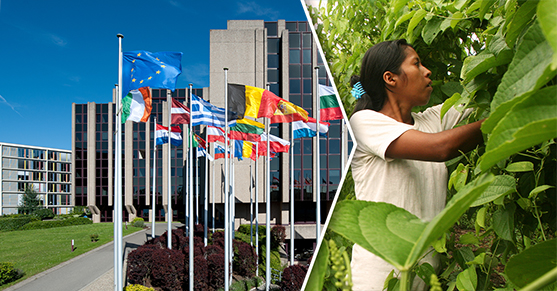On 20-21 October, the European Court of Auditors hosted an international conference on EU development aid policies, in Luxembourg. The EU is a major player in the field of international aid and has made 2015 the European year of development in line with the United Nations’ recent adoption of the Agenda 2030: Transforming our world and the related sustainable development goals.
In recognition of the importance of building the capacity of SAIs as key national accountability institutions, Kimi Makwetu, Chair of the CBC, was invited to give a presentation at the conference. The conference also brought together senior representatives from the European Institutions (the Parliament, the Commission, and the Council), United Nations, Word Bank, European Investment Bank, OECD, national development agencies, academia and donor and beneficiary countries.
Kimi Makwetu’s presentation focused on the need for strong accountability institutions in the developing world, given that accountability is a cornerstone for effective functioning states and a key element of democratic rule. He referred to the United Nations’ acknowledgement of the important role of independent and properly capacitated SAIs. The CBC Chair explained that SAIs are created to support democracy, accountability and good governance because of the way in which they enhance transparency; inform effective government decision-making; empower parliaments; the media and citizens; strengthen the fight against corruption, and have a positive impact on the levels of trust in society.
He explained the INTOSAI’s capacity building strategy and approach, and also shared the successful cooperation between INTOSAI and the donor community through the INTOSAI-Donor Cooperation, as an example of well-structured and coordinated multiple stakeholder cooperation. The value of the 2014 INTOSAI global stocktaking report was shared, as well as the key lessons learnt in INTOSAI’s efforts at capacity building, for example that –
o development efforts need to be linked to targeted programmes that are based on country conditions, priorities and needs to avoid the transferral of pre-packaged solutions from one country to another
o it is best if the initiative for development comes from inside the institution in need of development as this is a clear indication of the institutional leadership’s commitment to development
o development programmes should not be overambitious – realistic programmes will allow institutions to absorb capacity and gain confidence to graduate to next more ambitious development levels (the SAI of Sierra Leone was given as a prime example of a SAI that used its limited capacity to deliver value and benefits to its citizens by carrying out a real time audit on the management of Ebola Funds, thereby helping to ensure that public funds are fully and solely directed to the cause at hand and where there are anomalies, these are promptly dealt with)
o Leadership of the institution should also ensure that development priorities are included in the SAI’s strategic plan (the positive results of following a strategic approach to capacity development were explained by way of the SAI of Sudan obtaining Parliamentary approval to recruit their own staff in future and function more independently).
The hosts of the conference expressed their appreciation to the CBC Chair for having reminded all present about the importance of SAIs for transparency, accountability and good governance, and therefore for the need to maximise efforts at building SAI capacity.
by Cobus Botes, CBC Secretariat

